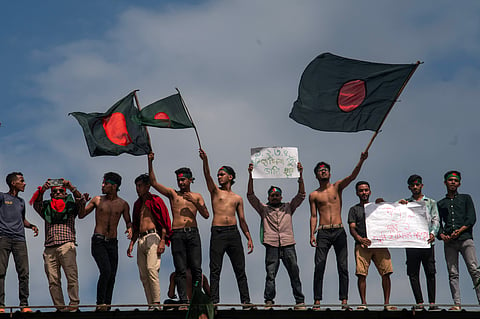Dispatch from Dhaka: Government’s shifting narratives amidst a sea of red
Editor’s note: Bangladesh has been burning since the beginning of July. Peaceful protests on university campuses by students opposing a quota system for government jobs, spiralled into unrest across the country after the prime minister, Sheikh Hasina, insulted the protesters and dismissed their concerns. Violence exploded when the student and youth wings of the ruling Awami League attacked protesters, with police action following on. On 20 July the government deployed the army and imposed a country-wide curfew to try and maintain order. As protests continued in the streets, large numbers of people have been reported killed and thousands were injured. The Bangladesh Supreme Court scaled down the quota after which there there was a brief but uneasy few days of peace. People resumed their protests over the weekend of 3 August asking for the release of those arrested and for Hasina's resignation, again accompanied by clashed with pro-government forces resulting in at least 90 people reported killed.
Shahidul Alam, a renowned photojournalist, educator and activist based in Dhaka, has been documenting the protests and the government’s brutal reprisal. Alam has managed to get his dispatches out to the media despite an internet shutdown imposed to try and contain the protests, which has since been partially lifted. Himal Southasian is republishing these dispatches, which offer a picture of the situation inside Bangladesh even as the internet shutdown has severely restricted the outflow of information.
The events and circumstances described in the dispatches have been changing rapidly and there have been several developments since Alam penned each of them. Internet connectivity has been partially restored, although it remains patchy and communication with many parts of the country remains difficult. On 4 August, at least 90 people were killed amidst worsening clashes with police and protesters. On 5 August, Hasina resigned and fled Bangladesh, and the army chief announced that an interim government would be installed to run the country. The dispatches reflect the extent of violence and repression unleashed by the Sheikh Hasina government against its people. They have been lightly edited for clarity.
Click here to read all dispatches.
Alam sent his fifth dispatch on 2 August 2024.
“A lie is like quicksand – the more you try to get out, the deeper you sink.”
The ministers and other government spokespeople take turns to do summersaults on their statements. The knots they get themselves into would have been funny, had they not involved the death of so many, most of them young.

